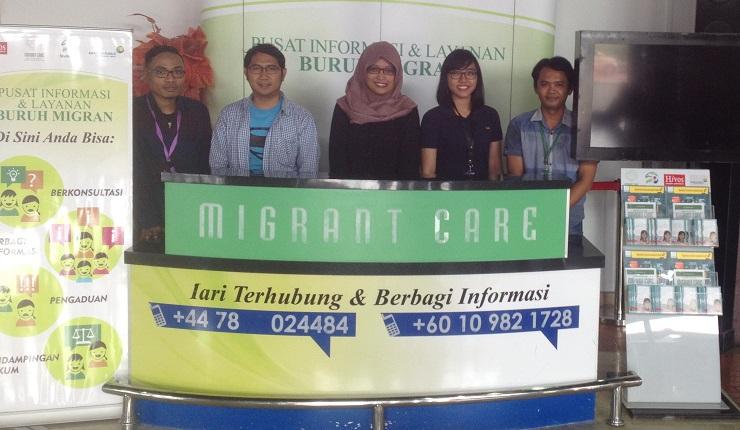ASIACALLING
In the departure lounge, arming Indonesian migrant workers with their rights
"From Jakarta, Nicole Curby has this report on a unique initiative to help migrant workers just hours before they leave the country."

There are an estimated 7 million
Indonesians working abroad, and the vast majority are women who work as maids
and domestic helpers in Asia and the Middle East.
But in an industry where workers frequently experience abuse and exploitation, the promise of higher wages also carries greater risk.
From Jakarta, Nicole Curby has this report on a unique initiative to help migrant workers just hours before they leave the country.
To the untrained eye, it’s not easy to pick out migrant workers from the other airline passengers – let alone guess their destination.
But after years of practice, Rima, Dede and Hajid, from the NGO Migrant Care have acquired an almost sixth sense.
Here at the international airport in Jakarta, they hone in on the details, the type of shoe, or the style of clothing.
Those going to countries like Taiwan and Hong they say, tend to wear sneakers, while workers traveling to the Middle East, tend to wear hijabs, and flip flops on their feet.
The mistreatment of Indonesian migrant workers abroad is a huge issue here.
Over the years there have been a string of horror stories: of physical abuse, of women burned by irons, of employees who have illegally retained the passports of their employees.
In response, last May the Indonesian government imposed a ban on workers seeking employment in 21 countries in the Middle East.
But many continue to go.
That’s why the Migrant Care team does their best to pass on some essential information to migrant workers about their rights, and what to expect abroad, just hours before they depart.
![]()
Every day, around 100 migrant workers depart Indonesia for destinations like Taiwan and Hong Kong.
Many more leave for the Middle East.
In 2013 the Indonesian National Board for Protection and Placement of Overseas Wokers received nearly 4 500 reports of abuse and poor working conditions from migrant workers.
The real unreported rate, Migrant Care says, is probably much higher.
Yet Migrant Care director, Anis Hidayah says the moratorium has only made workers more vulnerable, because it means they lack the necessary permits and legal protection when they decide to go despite the ban.
“Working abroad in the moratorium conditions makes the migrant workers more vulnerable to be the victims of trafficking, irregular migration, because there is no monitoring from the Indonesian government,” Hidayah explained.
When we met her at the airport, Dewi - which is not her real name - was returning to her job in Saudi Arabia after a three-month break.
Dewi has been working in the Middle East since her now grown up sons were in primary school, so she has heard a lot of stories about how things can turn bad for migrant workers.
“So you have one employer and he will sell you to another employer, if you are smart enough, you will refuse that, you’ll complain about that. You can report it here and there if you are smart,” she said.
Many migrant workers have their employment arranged by agents.
But some, even when they are at the airport ready to leave, know very little about where they are going. And they might not speak the language.
It makes it very difficult for them if anything goes wrong.
Back at the airport, after spotting a group of four women, looking slightly tentative, and wearing flip flops and headscarves, Hajid heads over to speak to them.
“They will go to Saudi Arabia,” he reported back.
“I asked them from which agency. Fortunately one worker remembers the agency’s name, while 3 others don’t. Even if they were sheltered and trained for two months, they don’t know the agency’s name. Next thing is they haven’t signed the job contract, but they are about to leave. This is so chaotic,” Hajid said.
Through their work at the airport, Migrant Care is also generating data on a largely undocumented sector.
Their initiative has also caught the attention of the Indonesian Ministry of Manpower, which will soon collaborate on the survey to help collect the important data.
And while they’re at it, Rima, Hajid and Dede make sure they give departing workers a small but important card. One they hope could be a lifeline.
“This card, it has our phone number, the mobile phone number of friends, of the office. It’s quite simple. They feel it’s easy if they want to chat personally, directly contact the office, or make a report from where they are.”
Hajid continued, “it’s the means through which we get many reports from migrant workers, as well as at the airport. It’s very important for Migrant Care.”
![]()
- Migrant Care
- Anis Hidayah
- Migrant workers Indonesia
- Nicole Curby
- Muhammad Hajid
Komentar (0)
KBR percaya pembaca situs ini adalah orang-orang yang cerdas dan terpelajar. Karena itu mari kita gunakan kata-kata yang santun di dalam kolom komentar ini. Kalimat yang sopan, menjauhi prasangka SARA (suku, agama, ras dan antargolongan), pasti akan lebih didengar. Yuk, kita praktikkan!